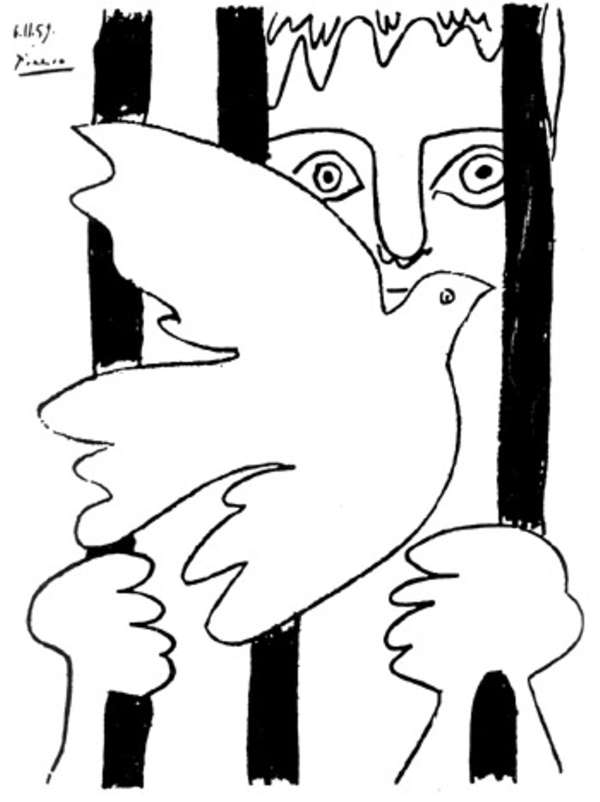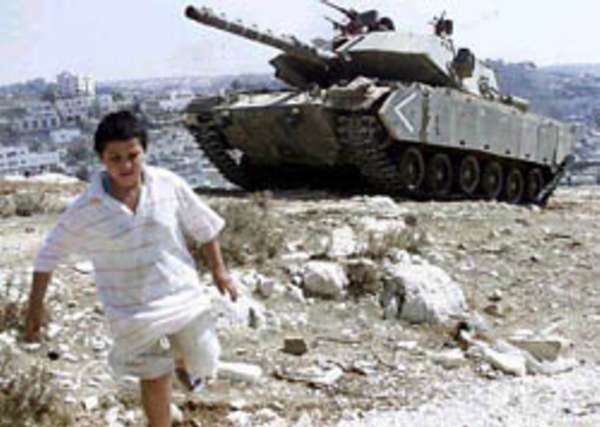
SEPTEMBER 2004

DANIEL TSAL CONSCIENTIOUS OBJECTOR
The 19-year old Tsal, inhabitant of Tel-Aviv, is spending repeated terms in the military prison system since April 13,2004, the date when he was supposed to join the army. At the end of each term he was again ordered to enlist and refused again.
In every conversation with army officers he reiterated the points he had made in an Open Letter to the Minister of Defence, back in March: "The principles of 'the only democracy in the Middle-East' have been steadily eroded and rendered void, with the rights of three million people being daily trampled underfoot, destroying the foundations upon which the state of Israel was supposed to be founded... In historical times such as the present, a sane person must confront the system which enables the oppression to go on. I have a moral obligation - not a choice, but a duty - to refuse to take part in the occupation, to reject institutes which which try to abolish the most elementary of human rights. A sane person, who has not yet been overcome fear and racism, owes it to basic humanity to refuse participation in such an instrument of occupation and oppression as the IDF has become."
Following his most recent imprisonment, Tsal added: "Since I first expressed my refusal, the army of occupation committed many additional violations of human rights: the destruction of houses and defoliation of fields, mistreatment of inhabitants at road-blocks, and also the killing of innocents, including children. Whenever I hear of such things I feel sorry and ashamed that the army of my country is doing such things - and happy that I am in prison rather then being part of that army."
Tsal told that the first two days of his present term were spent in extremely difficult conditions: "Forty detainees held together, crowded in a single small, dirty and stinking cell. The toilet is inside the cell, and it is overflowing all the time, filling the entire cell with a strong smell of excrement. All around, there are piles of garbage which nobody cleans away, and at night mice and other animals roam the cell "
Tsal told his parents. Only after two and half days was he transferred to another part of the prison, where conditions are more reasonable. "Let there be no mistake, I don't say that I was put there because of my political stand. This is a standard part of the military prison, and most of those imprisoned there are people who got in trouble with the military authorities for non-political reasons. And in fact, many of them are held in that hell for much longer then I was, sometimes for several weeks at a time. That place, officially designated as Mahlaka 5 of Pluga Gimel at Military Prison 4, is a place of infamy which must be closed down. But I am not surprised that an army which behaves cruelly to people under occupation ends up being cruel also to its own soldiers" says Tsal.
"It seems that the army command has learned nothing and forgotten nothing. They did not learn the lesson from the affair of the five refusers who had been detained and imprisoned, sentenced by a court martial and are imprisoned already for more then two years. The IDF command has not yet learned that you can't end or break the human conscience" say the refusers' parents.
For more information call Yehoshua and Esti Tsal, Daniel's parents, at
972-3-5184586 or 972-58-797378. Solidarity messages via
Jehoshua@freud.tau.ac.il.
~~~
| Letter
From an Israeli Jail The
Chief of Staff has announced that the
Palestinians constitute a cancerous threat and
has commanded that chemotherapy be applied
against them. The brigadier has imposed curfews
without time limits, and the colonel has ordered
the destruction of Palestinian fields. The
division commander has placed tanks on the hills
between their houses, and has not allowed
ambulances to evacuate their wounded. The
lieutenant colonel announced that the open-fire
regulations have been amended to an
indiscriminate order "fire!" The tank
commander, in turn, spotted a number of people
and ordered his gunner to launch a missile. By Yigal Bronner I would like to share with you some of my thoughts as I pass the long hours peeling bags of onions, washing dozens of large oily pots, or when I am asked to explain myself to those around me, people who find it difficult to understand my motives. Why does a man of my age--married with two children--"need all this"? Why is it worth my while to refuse serving in the occupied territories? Such questions have forced me to examine my actions from the perspective of the other prisoners. Here is a man, 36 years old, who is imprisoned with soldiers half his age. He is separated from his family, forbidden to take off his hat (even when sitting in his cell or while eating), to use a pillow or sheets, to wear a watch, to eat in the dining hall (rather, he eats on a folding table in the hallway near his cell, all the while behind bars) and to speak while working or eating. He is forced to work fourteen hours a day (in the kitchen or cleaning the bathrooms on the base), to stand at attention and yell "Attention!" every time an officer passes and to obey a long list of other commands and prohibitions, whose sole purpose is to humiliate him. Why would anybody in his right mind subject himself to this? In order to answer the above question seriously, one has to recall the alternative, what it was I refused to do. There is indeed an effort to humiliate me through a variety of regulations. But I believe that humiliating another human being is more humiliating by far. To look, for example, into the eyes of a Palestinian at a checkpoint and prevent him/her from reaching work, school, or the hospital. To look into the eyes of the residents upon whom I have just imposed another day of curfew--a curfew that seems to have no beginning and no end. To look into the eyes of a farmer whose orchards I am ordered to uproot--or in the eyes of a family whose house I am about to demolish. And to see my reflection in the eyes of these people: a despised soldier in front of trembling people who beg for his mercy. This, to me, is much, much more humiliating. There are, of course, those who claim that the presence of people like me in the occupied territories can make the occupation more humane. Indeed, it cannot be denied that one can uproot an orchard politely, demolish a house quietly and in a civilized manner, and perhaps even expel an entire population from their village--as has been done in South Hebron--in an organized and less violent way. It is possible, it seems, to calmly dispossess and oppress an entire people. The question, however, still arises: Can a person who wishes to retain his humanity carry out such actions? For me, the answer is clear: No. So when we, the refuseniks, declare that there are certain things that a just person simply does not do, we do not mean working in a kitchen, since such work is dignified. We mean actions that humiliate and deny the humanity of the Other. There is no doubt that it is better to sit in jail, isolated, wearing a hat, silent, washing dishes and peeling onions. I prefer--by far--to shed tears when I cut bag after bag of onions over the tears that arise whenever I conjure up images of the occupation. Sincerely, Dr. Yigal Bronner, 36, a father of two, lives in Jerusalem. He teaches Sanskrit and Indian studies at Tel-Aviv University and is an activist in Ta'ayush, Arab-Jewish Partnership and a contributor to The Other Israel: Voices of Refusal and Dissent (New Press). On October 28 he was sentenced to twenty-eight days in prison for refusing to serve in the occupied territories. (c) The Nation (www.thenation.com) 3. Dezember 2002 |
